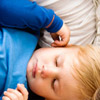Bedwetting: When your child is affected
The first thing to understand about bed wetting in children is that it’s a relatively common problem. In fact, while most children develop what’s called an ‘adult pattern’ of control over their urination habits by the time they reach 3 to 4 years old so that they’re dry both day and night, bed wetting – or nocturnal enuresis as it’s medically termed – occurs in as many as 20% of 5 year olds and up to 10% of 10 year olds.
It’s a condition that’s more common in boys than in girls, with one study showing how at age 7, between 15 and 22% of boys wet the bed, while 7 to 15% of girls do. The good news is that in the majority of cases, young children fall into the category of ‘infrequent bed wetting’ so that they wet the bed less than twice a week. In fact, it’s believed that only 2.4% of school-aged bed wetters wet the bed every night.
However, it’s also true that when a bed wetting problem persists past a child’s 10th birthday, it’s more likely to be classified as severe, which means they wet the bed three or more times a week.
The question is: If your child is a bed wetter, should you consider seeking help? The answer, according to the experts, is yes. That’s because, while children do tend to outgrow the problem, the impact that bed wetting has on a child can be significant, affecting everything from their self-esteem to their relationships with their friends and parents, and may even impact their performance at school. Children with a bed wetting problem are often teased by siblings and friends and may be reluctant to participate in school trips or attend gatherings which involve staying somewhere overnight.
In fact, even in children who experience a bed wetting ‘incident’ just once a month, the problem has been linked to lower self-esteem. Despite this, Australian statistics show that only 34% of families of children with bed wetting seek professional help, preferring to wait for what’s called spontaneous remission, where the child grows out of it naturally – something that does eventually occur in many children, but not all.
It’s unfortunate when you consider that not only has treatment for bed wetting been reported to improve self-esteem regardless of the type or even how successful it is, proper treatment of bed wetting can be effective in more than 90% of cases.
In contrast, the majority of techniques that families try themselves to solve the problem – including reward charts or restricting fluid intake before bedtime – aren’t effective. What’s more worrying is that as many as one-third of parents have used punishment as their first-line of defence against the problem at some stage, when the reality is that most children classified as ‘bed wetters’ are not doing it to be naughty or as an act of rebellion. In fact, while bed wetting was once believed to be a psychological condition, it’s now accepted that the emotional upsets, such as the behavioural problems that sometimes go hand-in-hand with the situation, (particularly in older bed wetting children) are actually the result of the problem rather than the cause.
For more information about causes of bed wetting and treatments such as alarm therapy, talk to your health care professional.
 | For more information about diagnosis, treatment options, shared bed wetting experiences and more, see Bed Wetting. |
REFERENCES:
- Robson WL. Evaluation and management of enuresis. N Engl J Med 2009; 360(14): 1429-36. [Abstract]
- Caldwell PH, Edgar D, Hodson E, et al. Bedwetting and toileting problems in children. Med J Aust 2005; 182(4): 190-5. [Abstract | Full Text]
- ButlerRJ, Heron J. The prevalence of infrequent bedwetting and nocturnal enuresis in childhood. Scand J Urol Nephrol. 2008;42(3):257-64. [Abstract]
- Rocha MM, CostaNJ, Silvares EFM. Changes in parents’ and self-reports of behavioral problems in Brazilian adolescents after behavioral treatment with urine alarm for nocturnal enuresis. Int Braz J Urol. 2008; 34(6): 749-57. [Abstract]
- Moulden A. Management of bedwetting. Aust Fam Physician. 2002;31(2):161-3. [Abstract]
- Thiedke CC. Nocturnal Enuresis. Am Fam Physician. 2003;67(7):1499-506. [Abstract | Full Text]
Dates
Tags
Created by:

 Login
Login














